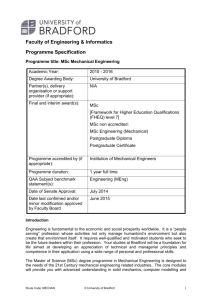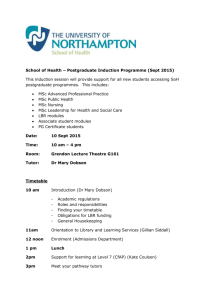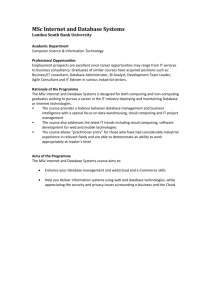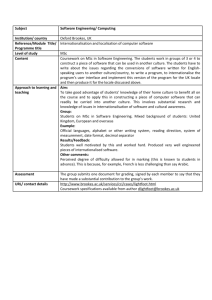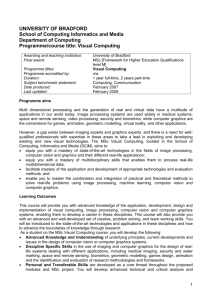MSc Civil and Structural Engineering
advertisement
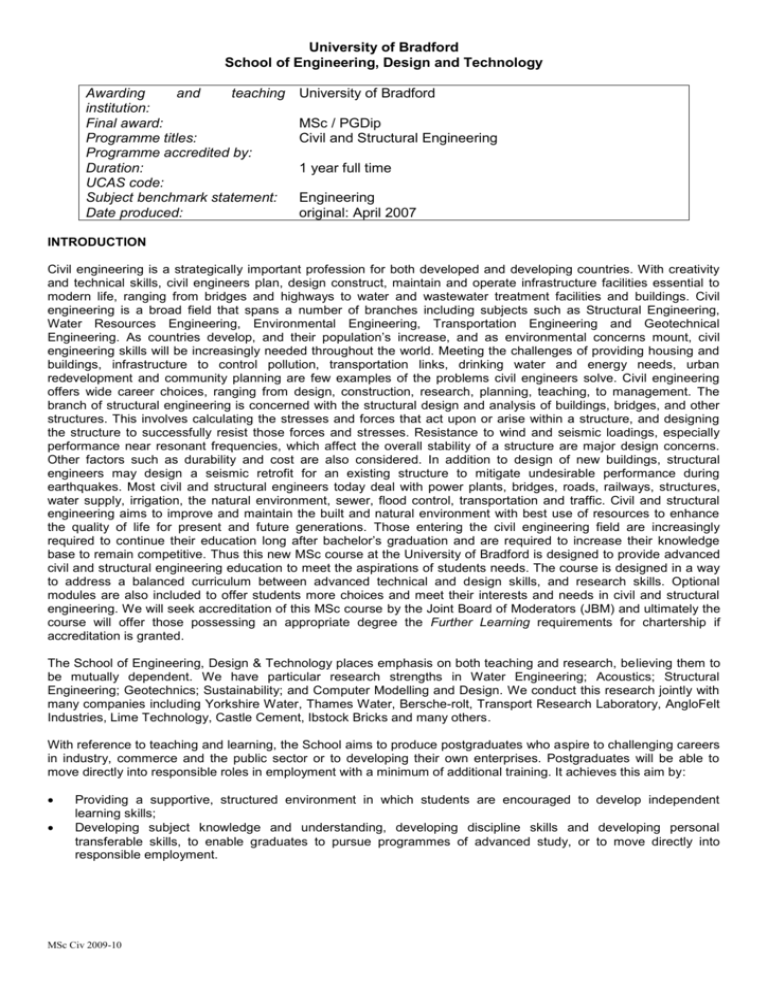
University of Bradford School of Engineering, Design and Technology Awarding and teaching institution: Final award: Programme titles: Programme accredited by: Duration: UCAS code: Subject benchmark statement: Date produced: University of Bradford MSc / PGDip Civil and Structural Engineering 1 year full time Engineering original: April 2007 INTRODUCTION Civil engineering is a strategically important profession for both developed and developing countries. With creativity and technical skills, civil engineers plan, design construct, maintain and operate infrastructure facilities essential to modern life, ranging from bridges and highways to water and wastewater treatment facilities and buildings. Civil engineering is a broad field that spans a number of branches including subjects such as Structural Engineering, Water Resources Engineering, Environmental Engineering, Transportation Engineering and Geotechnical Engineering. As countries develop, and their population’s increase, and as environmental concerns mount, civil engineering skills will be increasingly needed throughout the world. Meeting the challenges of providing housing and buildings, infrastructure to control pollution, transportation links, drinking water and energy needs, urban redevelopment and community planning are few examples of the problems civil engineers solve. Civil engineering offers wide career choices, ranging from design, construction, research, planning, teaching, to management. The branch of structural engineering is concerned with the structural design and analysis of buildings, bridges, and other structures. This involves calculating the stresses and forces that act upon or arise within a structure, and designing the structure to successfully resist those forces and stresses. Resistance to wind and seismic loadings, especially performance near resonant frequencies, which affect the overall stability of a structure are major design concerns. Other factors such as durability and cost are also considered. In addition to design of new buildings, structural engineers may design a seismic retrofit for an existing structure to mitigate undesirable performance during earthquakes. Most civil and structural engineers today deal with power plants, bridges, roads, railways, structures, water supply, irrigation, the natural environment, sewer, flood control, transportation and traffic. Civil and structural engineering aims to improve and maintain the built and natural environment with best use of resources to enhance the quality of life for present and future generations. Those entering the civil engineering field are increasingly required to continue their education long after bachelor’s graduation and are required to increase their knowledge base to remain competitive. Thus this new MSc course at the University of Bradford is designed to provide advanced civil and structural engineering education to meet the aspirations of students needs. The course is designed in a way to address a balanced curriculum between advanced technical and design skills, and research skills. Optional modules are also included to offer students more choices and meet their interests and needs in civil and structural engineering. We will seek accreditation of this MSc course by the Joint Board of Moderators (JBM) and ultimately the course will offer those possessing an appropriate degree the Further Learning requirements for chartership if accreditation is granted. The School of Engineering, Design & Technology places emphasis on both teaching and research, believing them to be mutually dependent. We have particular research strengths in Water Engineering; Acoustics; Structural Engineering; Geotechnics; Sustainability; and Computer Modelling and Design. We conduct this research jointly with many companies including Yorkshire Water, Thames Water, Bersche-rolt, Transport Research Laboratory, AngloFelt Industries, Lime Technology, Castle Cement, Ibstock Bricks and many others. With reference to teaching and learning, the School aims to produce postgraduates who aspire to challenging careers in industry, commerce and the public sector or to developing their own enterprises. Postgraduates will be able to move directly into responsible roles in employment with a minimum of additional training. It achieves this aim by: Providing a supportive, structured environment in which students are encouraged to develop independent learning skills; Developing subject knowledge and understanding, developing discipline skills and developing personal transferable skills, to enable graduates to pursue programmes of advanced study, or to move directly into responsible employment. MSc Civ 2009-10 AIMS The aims of this MSc programme are: To provide students with the advanced theoretical knowledge, concepts and skills necessary for original thought and problem analysis related to civil and structural engineering. To provide students with deepened academic and technical skills necessary to integrate their knowledge and understanding to solve a range of complex engineering problems. To enable students to carry out independently, but under supervision, a specific research project in civil and structural engineering. To provide those possessing an accredited undergraduate degree, the Further Learning educational requirements (in compliance with UK-SPEC) to permit progression to Chartered Membership of the Institution of Civil Engineers and/or the Institution of Structural Engineers and/or the Institution of Highways and Transportation, and registration with the Engineering Council (UK) as a Chartered Engineer. LEARNING OUTCOMES Learning outcomes indicate what a graduate should know and understand, and be able to do on successful completion of the programme. They have been developed with reference to the Engineering subject benchmark, published by the QAAHE and The UK Standard for Professional Engineering Competence. Knowledge and Understanding The students on this MSc course will build on their undergraduate level to deepen and develop advanced knowledge and understanding of principles underpinning science and mathematics, engineering analysis and practice, design, and sustainability needed in civil and structural engineering, water engineering, geotechnics, and multi-disciplinary design. Students will integrate their technical and non-technical knowledge and understanding through the whole programme to solve a range of complex civil and structural engineering problems. The teaching and learning methods implemented to engage students in developing their Knowledge and Understanding of the course include formal lectures, case studies, tutorial exercises, practical demonstrations, directed learning, and group and individual work. The method of assessment is by written examinations and both analytical and experimental coursework. Intellectual Abilities The students will develop abilities to: Apply engineering principles and inter-personal skills to the critical analysis of multi-disciplinary complex problems in order to create innovative solutions to these problems; Integrate engineering understanding and apply insight to the solution of real problems; Approach, construct, analyse and solve design problems; Demonstrate intellectual capabilities of formulation, conceptualisation and reflection of complex non-routine problems; Develop abilities to plan a research programme of work, conduct corresponding experimental and theoretical work and report findings in a critical thesis; Demonstrate self direction and originality in problem solving. Practical Skills Exercise initiative and personal responsibility in professional practice; Design or develop new skills or procedures for new situations; Develop a range of laboratory skills from their individual research project; Use software packages in the advanced analysis, design and evaluation of complex engineering systems. General Transferable Skills It is aimed that upon completion of the MSc programme, students will have developed transferable skills such as: Use critical thinking; evaluation and integration of scientific and technological information from a variety of sources. The ability to learn in a structured but broad programme and manage accordingly their time and effort and the resources available to them. The ability to develop, monitor and update a research plan, taking into account changes that may affect the plan. Work effectively with a group as leader or member, make appropriate use of the capacity of group members, negotiate and handle conflict with confidence. CURRICULUM This is a 12-month course that starts in September. The curriculum of this course is made up of a taught element of 100 credits and an individual MSc research project element of 80 credits. The taught element is structured in the form of modules carrying 10 or 20 credits arranged within the two semesters forming the academic session. The first semester is based on numerical and design modules aiming to bring students up to a common level in order to progress to semester 2, which is made of detailed technical core and optional high level subjects. The MSc project forms the major part of this MSc programme. It gives students the opportunity to develop their ability to learn, research and work independently. Students are expected to integrate their knowledge to develop practical evaluation and solution(s) on a significant project in the Civil and Structural Engineering sector. The structure of the curriculum, MSc Civ 2009-10 which shows the core (C) and optional (O) modules for this programme is presented in the table below. The curriculum may change, subject to the University's course approval, monitoring and review procedures, as improvements are made each year. More details, including learning outcomes and assessment, are available for each unit. Unit Code Credit Semester Level Module Title C/O ENG4022M 10 1 M Advanced Structural Analysis C ENG4091L 20 1, 2 M Advanced Structural Engineering Project C ENG4080M 10 1 M Engineering Vibration C ENG4029M 10 1 M Design Optimisation C ENG4031M 10 1 M Advanced Numerical Methods C ENG4074M 10 2 M Advanced Geotechnics C ENG4075M 10 2 M C ENG4084M 10 2 M Earthquake Engineering Environmental Computational Fluid Dynamics ENG4073M 10 2 M Advanced Solid Mechanics O ENG4025M 10 2 M Finite Element Methods O ENG4064M 10 2 M Sustainable Energy O ENG4072M 10 2 M Risk Management O ENG4098B 80 1,2,3 M MSc Project C Semester 2: only 1 option to be selected 10 Credit rating of options to be selected C C – Core; O – Option PROGRESSION AND AWARD Student assessment and progression is determined by the University Regulations and Procedures detailed in http://www.brad.ac.uk/admin/acsec/QA_Hbk/Postgrad_Taught_Regs.html and in the University’s Quality Assurance Handbook. To be eligible for a Masters Degree, you must achieve at least 40% in 160 credits and 35% in the other 20 credits. If you attain an overall weighted average of at least 70.0% at the initial attempt, including at least 70.0% at the initial attempt in your dissertation, you will be eligible for the award of the Degree of Master with Distinction. Similarly, for an overall weighted average at least 60% at the initial attempt and at least 60% at your initial attempt at your dissertation, you will be eligible for the award of the Degree of Masters with Merit. To be eligible for the award of the Postgraduate Diploma, you must achieve at least 40.0% in 100 Credits and at least 35.0% in the other 20 Credits. If you attain an overall weighted average of at least 70.0% in the initial attempt in the assessments for the units concerned you will be eligible for the award of a Postgraduate Diploma with Distinction. Similarly for an overall weighted average of at least 60.0% in the initial attempt in the assessments for the units concerned you shall be eligible for the award of a Postgraduate Diploma with Merit. ADMISSION REQUIREMENTS In addition to satisfying the general admissions requirements of the University of Bradford, you must have a first degree in relevant discipline; normally a Second-class Honours degree or equivalent in Science, Engineering, or Technology. Candidates who do not fulfil the normal entry requirements but have extensive industrial experience in Civil and Structural Engineering are considered on an individual basis. Those applicants seeking to use this MSc, if it is accredited by the JBM, as Further Learning to satisfy the educational base requirements for chartership must also be in possession of an appropriate accredited degree. English Language Requirements: All students must satisfy the English language requirements for admission as described in http://www.brad.ac.uk/international/english-prepare.php. If your native language is not English, you will have to pass a test in English approved by the University before you can be admitted. The following qualifications are acceptable as satisfying this requirement. Both are available internationally. MSc Civ 2009-10 The International English Language Testing Service Test (IELTS) administered by the British Council is the test, which is preferred by the University. You will need to achieve an Overall Band of at least 6, with at least 5 in each of the four sub-tests. Testing facilities are available at most British Council overseas offices. When you take your test, you should ask for a copy of your Test Report Form to be sent to the University. The Test of English as a Foreign Language (TOEFL) administered by the Educational Testing Service, Princeton, New Jersey, 08540, USA. You will need to score at least 550 (220 on the computer-based test). If you take this test, you should enter the University's code 0828, on your answer sheet. TEACHING, LEARNING & ASSESSMENT STRATEGIES The teaching and learning strategy takes into consideration the learning outcomes, progression through the levels of study, and the nature of the subject, and the need for you to take greater responsibility for your own learning as you progress through the course. The strategies and methods implemented are: The teaching and learning methods implemented to engage you in developing your knowledge and understanding of the course include formal lectures (including those from Visiting Lecturers), case studies, tutorial exercises, practical demonstrations, directed learning and individual work. The method of assessment is by written examination and both analytical and experimental coursework. The methods implemented in developing your intellectual skills include engaging with you during tutorial exercises, case studies, practical demonstration and supervised research or project work. The methods of assessment of intellectual skills are implicit in the written examinations, analytical and experimental coursework and more particularly in your MSc dissertation and PG/Dip final report. The methods implemented in developing your practical skills include demonstrations and practicals linked with the taught modules. You will also design and operate equipment and use control and measuring instruments under supervision during your research project. The methods of assessment of practical skills include feedback on laboratory work linked with the taught modules. Also a large part of the mark of the MSc dissertation and the PG/Dip will be attributed to the Experimental Method and Equipment and the Presentation & Discussion of Results. The methods implemented in developing your transferable skills are implicit in the programme. The University of Bradford is well known for attracting students from a wide variety of backgrounds, experiences and countries. This and the learning facilities available to all students provide the conditions for students to develop and manage their learning. The University of Bradford modus operandi, Making Knowledge Work, is imbedded in the philosophy of this course, particularly in the area of Engineering, Design and Technology, which is well equipped with practical and computational facilities. The methods of assessment of transferable skills are built in the structure of the examinations, case studies, laboratory demonstrations and research or project work. STUDENT SUPPORT & GUIDANCE The University and the School of Engineering, Design and Technology have a well-deserved reputation in this area, acknowledged by our QAAHE subject review and HEFCE research review. You will be allocated a Course Tutor supported by a Postgraduate Course Secretary who will have overall responsibility for the course and a Project Supervisor who will support and guide you throughout your research project. The School runs an induction programme and orientation for all new students, which includes introduction to the library and the computer centre. It provides a comprehensive set of documentation on all aspects of the University regulations, course and modules details and management via the course handbook. The support provided by the School is enhanced by a strong university infrastructure, including particularly the Disabilities Office and the Careers Service, and by extended access to library and computing facilities. International Students benefit from additional support from the University International Office, its International Student Advisers and the Students Union Welfare Service (details at: http://www.brad.ac.uk/international/). At the University of Bradford, we now have students from over 100 different countries. This means that we have a great deal of experience of working and socialising with people from a variety of different cultures, and if you are an international student you can be assured of a friendly and stimulating environment. FURTHER INFORMATION For further information, please check the University prospectus or contact the University’s Admissions Office, or the School of Engineering, Design & Technology PG Admissions Secretary: The Admissions Office, University of Bradford, Bradford BD7 1DP Tel: +44 (0)1274 233054 Email: admissions@bradford.ac.uk The PG Admissions Secretary, School of Engineering, Design & Technology University of Bradford, Bradford BD7 1DP Tel: +44 (0)1274 234014, Email: v.a.shaw@Bradford.ac.uk The contents of this Programme Specification may change, subject to the University's course and regulatory approval, monitoring and review procedures. MSc Civ 2009-10



